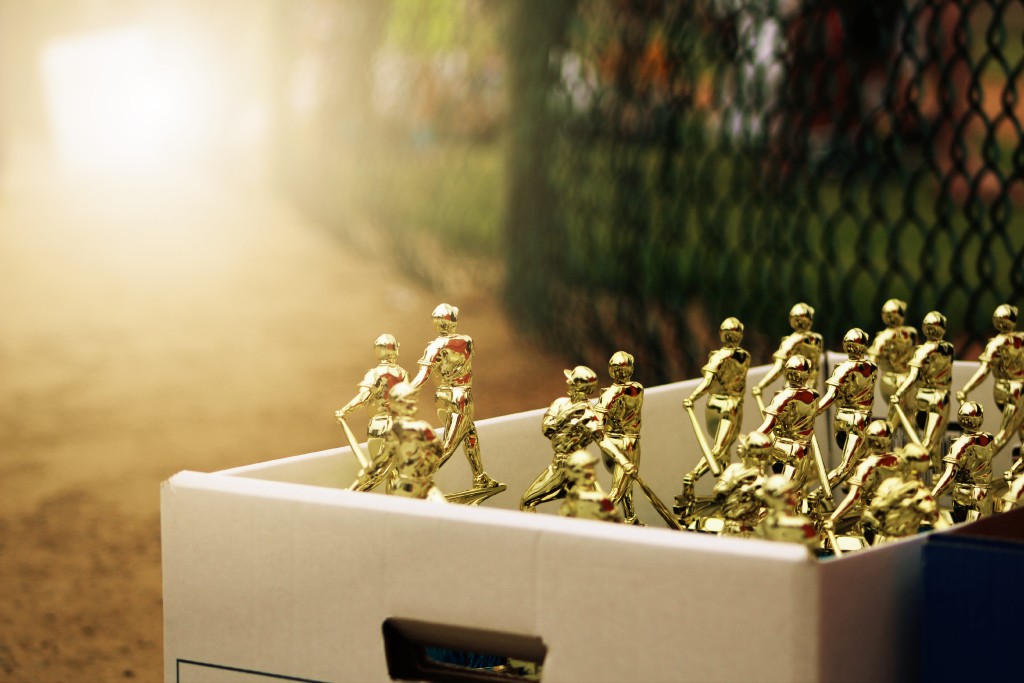By Alex Flanagan
“Aww, I really wanted a trophy,” my son moaned while dragging the giant orange pylon his coach had creatively gifted each Little League player at the end of the season so they could use it as a practice tee. My son knew his team wasn’t the best in his league, yet he still assumed he’d go home with some hardware. Why wouldn’t he? After all, there are a half dozen trophies on top of his dresser that he hasn’t won, but received for participating in a variety of sports. It’s not his fault that in our eagerness to increase our young athletes’ sense of self worth and confidence with trophies we’ve confused the hell out of our kids. Because now, they have no idea HOW you actually get a trophy.
Do you just show up? Does it have to be earned? Is it a reward given for effort? Do the parents decide?
“Giving all kids a trophy is based on the self-esteem movement going on several years ago. A movement that went seriously awry!” says clinical psychologist Abby Brewer-Johnson. “As with many of these movements and programs they took some good information but took it way too far.”
As educator Michael McArdle sees it, it’s not the trophy that creates any issue in sports, it’s the accompanying message. “If you want to have the first place trophy, you have to earn it through dedication, perseverance, teamwork and good luck! Yes … luck. Along the way, a team may lose their best player to a freak injury – and that is bad luck,” says McArdle.
Luck, life isn’t fair. These are some of the lessons we parents are tasked with teaching our children. It’s challenging, even for adults, to understand that when the 100% they’ve given isn’t enough, they still are. That’s why Brewer-Johnson says, “We need to help kids have a realistic sense of their capabilities – both strengths and weaknesses – not an inflated sense of self based on the false belief that they earned something that they did not.”
Winning a trophy used to mean you out-performed everyone else. You touched the wall first, jumped the highest, ran the fastest, sunk the most baskets or scored the most goals. That took work. When our kids get trophies for not putting in the work, it’s teaching them an entirely different lesson.
“This type of trophy symbolizes your commitment to an effort and recognizes instead that starting and finishing are at the heart of competition,” says McArdle.
By giving trophies just for participating, it seems to me that we’re missing a perfect opportunity to educate our children about the frustrations and letdowns that real life will inevitably bring. What happens when our children don’t get into the college they wanted, or get their dream job, or when someone breaks up with them? No one will be handing them a trophy; we all know that. What many of us don’t realize, though, is the reason we feel compelled to make sure our kids’ buckets are filled with prizes might have more to do with us and how our kids’ emotions make us feel.
“Too many parents have difficulty tolerating their children’s feelings, so they tend to rescue them,” says Brewer-Johnson. “This does not make for a resilient child, in fact, these children tend to be more fragile and have difficulty coping later in life. Children need to know that they are embedded in relationships with other people, that they are human like everyone else and therefore subject to failures, disappointments and that they will not always win!”
Well, doesn’t that just make perfect sense? In real life, few of us win all of the time. So why are we teaching our children the exact opposite?
Giving every kid a trophy doesn’t teach the focus, dedication, sacrifice, practice or hard work that it takes to be the best at something. All it does is take away one of the great tools for teaching motivation – winning … a trophy.
